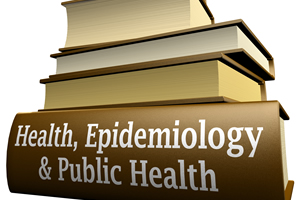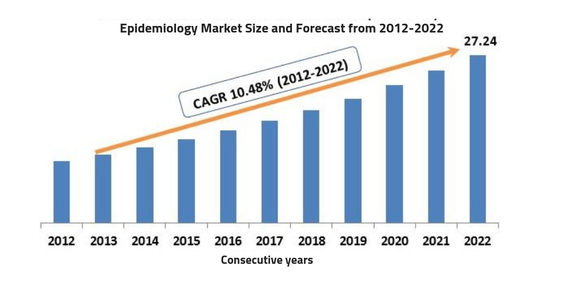
Epidemiology 2019

Theme: New Innovations & Current Trends in the field of Epidemiology
We take the pride to welcome you to the 2ndInternational Conference on Epidemiology which is going to be held during August 19-20, 2019 at Toronto, Canada. The theme of this conference is “New Innovation and Current Trends in Epidemiology”. This Epidemiology 2019 conference gathers renowned Eminent Scientists/Research Professors, Junior/Senior research fellows, Students, Epidemiologists, Members of different Epidemiology Societies & Association, Medical & Pharmacy Companies and Manufacture medical devices & companies in the field of Epidemiology under a single roof where networking and global partnering happens for the acceleration of future research.
Session 1 Epidemiology and Health Care :
Epidemiology is an information science. Through a variety of approaches, epidemiology generates information for decision making by health professionals working at all levels of the health care system. Public health research draws from a number of academic disciplines, including anthropology, history, economics, sociology and political science, as well as epidemiology and statistics. Yet, there continues to be tension between social and medical research disciplines, particularly in conceptualising health as a collectively owned right, in comparison with diseases and illnesses, which are individually measured and treated.
Related Societies:
International Society for Environmental Epidemiology | American College of Epidemiology | American Board of Internal Medicine | American Board of Medical Genetics | American Board of Emergency Medicine | Italian Association of Epidemiology | Australasian Epidemiological Association | Association Mexicana de Epidemiology | German Society for Epidemiology | Association of Chinese Epidemiology
Epidemiology Conference | Nutritional epidemiology Conferences | Epidemiology Congress | Public Health Conferences | Epidemiology Events | Epidemiology Meetings
Session 2 Environmental Epidemiology :
Environmental epidemiology is a branch of epidemiology that is related to determining how environmental risks affect human health. This area tries to understand how different external risk factors can prevent or prevent disease, illness, injury, developmental abnormalities or death..
Related Societies:
International Society for Environmental Epidemiology | American College of Epidemiology | American Board of Internal Medicine | American Board of Medical Genetics | American Board of Emergency Medicine | Italian Association of Epidemiology | Australasian Epidemiological Association | Association Mexicana de Epidemiology | German Society for Epidemiology | Association of Chinese Epidemiology
Epidemiology Conference | Nutritional epidemiology Conferences | Epidemiology Congress | Public Health Conferences | Epidemiology Events | Epidemiology Meetings
Session 3 Genetic Epidemiology :
Genetic epidemiology is concerned with understanding heritable aspects of disease risk, individual susceptibility to disease, and ultimately with contributing to a comprehensive molecular understanding of pathogenesis. The massive investment and expansion of human genetics, if it is to return value for the common good, must be integrated into public health functions. The human genome epidemiology network has been established to promote the use of genetic knowledge in terms of genetic tests and services for disease prevention and health promotion.
Related Societies:
International Society for Environmental Epidemiology | American College of Epidemiology | American Board of Internal Medicine | American Board of Medical Genetics | American Board of Emergency Medicine | Italian Association of Epidemiology | Australasian Epidemiological Association | Association Mexicana de Epidemiology | German Society for Epidemiology | Association of Chinese Epidemiology
Epidemiology Conference | Nutritional epidemiology Conferences | Epidemiology Congress | Public Health Conferences | Epidemiology Events | Epidemiology Meetings
Session 4 Cancer Epidemiology :
Cancer Epidemiology represents the investigation of elements in responsible of the inception, metastasis and guess of different sorts of malignant growth. Epidemiological research discoveries on disease can encourage the detailing of appropriate helpful treatment techniques and preventive medicines for cancer. It is the exposure to specific chemical and physical agents is potentially one of the most important ways in which analytical epidemiologic methods can contribute to the knowledge of cancer etiology.
Related Societies:
International Society for Environmental Epidemiology | American College of Epidemiology | American Board of Internal Medicine | American Board of Medical Genetics | American Board of Emergency Medicine | Italian Association of Epidemiology | Australasian Epidemiological Association | Association Mexicana de Epidemiology | German Society for Epidemiology | Association of Chinese Epidemiology
Epidemiology Conference | Nutritional epidemiology Conferences | Epidemiology Congress | Public Health Conferences | Epidemiology Events | Epidemiology Meetings
Session 5 Nutritional Epidemiology :
Nutritional epidemiology is one of the younger disciplines in epidemiology. This may be partially due to the difficulties in measuring diet as an exposure. Diet and physical activity are arguably the most difficult exposures to assess in observational research and are plagued by considerable measurement error. Hence we are all exposed, and the variation may be more subtle than with other, more distinct exposures such as smoking or use of hormone replacement therapy.
Related Societies:
International Society for Environmental Epidemiology | American College of Epidemiology | American Board of Internal Medicine | American Board of Medical Genetics | American Board of Emergency Medicine | Italian Association of Epidemiology | Australasian Epidemiological Association | Association Mexicana de Epidemiology | German Society for Epidemiology | Association of Chinese Epidemiology
Epidemiology Conference | Nutritional epidemiology Conferences | Epidemiology Congress | Public Health Conferences | Epidemiology Events | Epidemiology Meetings
Session 6 Molecular Epidemiology :
Molecular epidemiology is a multidisciplinary field combining molecular biology methods and epidemiological design embracing also such fields as cell biology, biochemistry and statistics. It aims at developing molecular markers to aid in revealing exposures, setting diagnosis, detection of early disease, follow-up of treatment and individual susceptibility of diseases. In molecular epidemiology, research is done in many cases among healthy people with one of the main aims being to reveal individual risk, and studies are often genetic by nature. Consequently, there are important ethical aspects to consider on one hand to protect people, and on the other hand, to increase understanding of the positive implications.
Related Societies:
International Society for Environmental Epidemiology | American College of Epidemiology | American Board of Internal Medicine | American Board of Medical Genetics | American Board of Emergency Medicine | Italian Association of Epidemiology | Australasian Epidemiological Association | Association Mexicana de Epidemiology | German Society for Epidemiology | Association of Chinese Epidemiology
Epidemiology Conference | Nutritional epidemiology Conferences | Epidemiology Congress | Public Health Conferences | Epidemiology Events | Epidemiology Meetings
Session 7 Cardiovascular Epidemiology:
Cardiovascular disease (CVD) is a major cause of morbidity and mortality worldwide, with the lifetime risk exceeding 60%. Major advances in cardiovascular epidemiology over the last 4 decades have improved our understanding of the pathogenesis of CVD, with the identification and treatment of several major risk factors. Thus, cardiovascular epidemiology is confronted by a dualism: unprecedented opportunities for new research directions amid a growing uncertainty about its potential value and a pressure to do more and be more accountable.
Related Societies:
International Society for Environmental Epidemiology | American College of Epidemiology | American Board of Internal Medicine | American Board of Medical Genetics | American Board of Emergency Medicine | Italian Association of Epidemiology | Australasian Epidemiological Association | Association Mexicana de Epidemiology | German Society for Epidemiology | Association of Chinese Epidemiology
Epidemiology Conference | Nutritional epidemiology Conferences | Epidemiology Congress | Public Health Conferences | Epidemiology Events | Epidemiology Meetings
Session 8 Psychiatric Epidemiology:
The Psychiatric epidemiology has done little to illuminate either the etiology or the environmental factors that create mental illnesses. Because of the limits of its knowledge base, the policies stemming from epidemiological studies have served to justify the predominant ideological and administrative interests of psychiatrists, researchers, and policymakers. The lack of an adequate system of classification of mental illnesses has been the primary factor limiting the development of Psychiatric epidemiology and, consequently, its usefulness for developing effective public policy toward mental illnesses.
Related Societies:
International Society for Environmental Epidemiology | American College of Epidemiology | American Board of Internal Medicine | American Board of Medical Genetics | American Board of Emergency Medicine | Italian Association of Epidemiology | Australasian Epidemiological Association | Association Mexicana de Epidemiology | German Society for Epidemiology | Association of Chinese Epidemiology
Epidemiology Conference | Nutritional epidemiology Conferences | Epidemiology Congress | Public Health Conferences | Epidemiology Events | Epidemiology Meetings
Session 9 Scientific Epidemiology:
Epidemiology has provided a scientific foundation for public health and disease prevention. Epidemiology has contributed to major scientific discoveries such as the relationship between cigarette smoking and common diseases. Yet, the observational nature of much of epidemiologic research has attracted criticism including excess expense, repudiated findings, that offer small incremental, knowledge, inability to innovate at reasonable cost, and failure to identify research questions with the greatest merit.
Related Societies:
International Society for Environmental Epidemiology | American College of Epidemiology | American Board of Internal Medicine | American Board of Medical Genetics | American Board of Emergency Medicine | Italian Association of Epidemiology | Australasian Epidemiological Association | Association Mexicana de Epidemiology | German Society for Epidemiology | Association of Chinese Epidemiology
Epidemiology Conference | Nutritional epidemiology Conferences | Epidemiology Congress | Public Health Conferences | Epidemiology Events | Epidemiology Meetings
Session 10 Social Epidemiology:
The recent research shows that cumulative neighbourhood socioeconomic disadvantage was associated with increase in the odds of developing diabetes at middle age, with a dose-response association; those exposed to neighbourhood socioeconomic disadvantage for a shorter duration showed a less increased risk. The association remained after controlling for individual socioeconomic status. The results show that the effect of neighbourhood disadvantage becomes visible in childhood (poor diet), adolescence (low physical activity, increased prevalence of daily smoking) and early adulthood.
Related Societies:
International Society for Environmental Epidemiology | American College of Epidemiology | American Board of Internal Medicine | American Board of Medical Genetics | American Board of Emergency Medicine | Italian Association of Epidemiology | Australasian Epidemiological Association | Association Mexicana de Epidemiology | German Society for Epidemiology | Association of Chinese EpidemiologyEpidemiology Conference | Nutritional epidemiology Conferences | Epidemiology Congress | Public Health Conferences | Epidemiology Events | Epidemiology Meetings
We take the pride to welcome you to the 2nd International Conference on Epidemiology which is going to be held during August 19-20, 2019 at Toronto,Canada. The theme of this conference is “New Innovation and Current Trends in Epidemiology”. This Epidemiology 2019 conference gathers renowned Eminent Scientists/Research Professors, Junior/Senior research fellows, Students, Epidemiologists, Members of different Epidemiology Societies & Association, Medical & Pharmacy Companies and Manufacture medical devices & companies in the field of Epidemiology under a single roof where networking and global partnering happens for the acceleration of future research.
Target Audience:
Academic researcher
Epidemiologists
Healthcare experts
Researchers
Medical colleges
Training institute
Epidemiology Societies & Association
Medical & Pharmacy Companies
Software development companies
Business entrepreneurs
Manufacture medical devices & companies
Scope and Importance of Epidemiology:
An important epidemiologic premise is that individuals with the same disease entity have similar causes of the disease, and show similar natural history of the disease and similar responses to treatment or intervention. Under this important assumption, observations in a population study which contains a large number of individuals with a certain disease can be generalized to patients with the same disease in a different set of people in the same background population or in people in a different background population. In this context, traditional epidemiology has contributed to not only the successful identification of major etiologic factors even without molecular sub-classification but also the development of prevention strategies, such as smoking cessation programs.
Another aspect of major contributions of epidemiologic studies to broader biomedical and health sciences is provision of study subjects and materials. Epidemiologic research typically requires intensive efforts to carefully select subjects from a larger population, compile information on environment, lifestyle, behaviour, health and diseases, collect biospecimens, and build a large database infrastructure. Such epidemiologic resources can become an enormous asset for transdisciplinary research, and provide a large sample of disease patients, which is more representative of the general population than a typical hospital-based convenience sample.
Accordingly, along with advances in computing, bioinformatics, genomic medicine and biomedical sciences, modern epidemiology has broadened to integrate these disciplines. This advancement has been opening enormous opportunities, including the evolution of molecular pathological epidemiology.
Why in Toronto?
Toronto is the major and the capital city of the province of Ontario in Canada. It is the largest population centre in Ontario by population over 5 million. It is situated on the north-west shore of Lake Ontario. Toronto’s motto is “Diversity Our Strength. This city is a global finance, commerce as well as transportation hub. It has always been ranked highly in the fields of life expectancy, personal safety, healthcare, education etc.
List of Universities having Epidemiology and Public Health Departments:
McMaster University, Canada
Karolinska Institute, Sweden
Cardiff University, UK
Lund University, Sweden
Columbia University, New York
University of Pennsylvania
Linkoping University, Sweden
University of Gothenburg, Sweden
University of California, US
University of Arizona, US
Emory University, US
George Washington University, USA
Institute for Health Metrics and Evaluation, WA
Johns Hopkins University, USA
University of Oslo, Norway
University of Tampere, Finland
University of Iceland, Iceland
Stockholm University, Sweden
Market Research on Epidemiology:
Epidemiological reconnaissance is conducted all over to examine the etiological components of disease and causes for spreading and its preventative measures. This Epidemiology conference gives the international platform for recent research on the uprising and re-rising diseases, communicable diseases, Non-communicable diseases. This conference has the extent to be the source of the medical specialty variables like origin, spread and up to date status of different diseases and disorders causing deaths in several nations.

The worldwide Epidemiology advertise has been esteemed at USD 13.45 Billion out of 2016 and is required to develop at a CAGR of 10.2% to reach to USD 23.88 Billion by 2022. The development of the general market for epidemiology can be ascribed to the developing interest for the customized drug, developing ventures, allows, and supports by the administration; ascend in look into exercises in the field of Epidemiology and public healthcare; expanding a number of new businesses, and expanding utilization of genomic sequencing in the diagnostics. In the coming years, North America is relied upon to represent the biggest offer of the worldwide market. Base year considered for the report is 2016 and the estimated time frame incorporates 2017– 2022. he worldwide Epidemiology showcase was assessed around USD 10.06 billion in the 2012 and is relied upon to reach roughly USD 27.24 billion before the finish of 2022 while enrolling itself at a compound yearly development rate (CAGR) of 10.48% over the estimated time frame. Genomics is a division of science that incorporates the investigation of qualities and their works and actualizes bioinformatics, recombinant DNA, and DNA sequencing techniques to examine grouping and force together with the capacity and structure of genomes. It includes practical genomics, relative genomics, Pharmacogenomics, basic genomics, and epigenetics. Genomics has rendered various applications in a few fields like biotechnology, human studies, genomic solution, and different sciences.
The worldwide genomics advertise has encountered an ascent in industry potential attributable to mechanical developments as new informatics gets to that amalgamate different types of information with genomic information in ailment inquire about which allowing specialists to comprehend the hereditary bases of an assortment of medication reaction and infections all the more successfully. Also, an ascent in half or full pay for this industry by the legislature of specific nations, developing the event of lethal sicknesses like diabetes, growth, and others give the ascent in their necessity in the worldwide advancement. Heightening gets to for novel genomics instruments and procedures, ascertain their advantage to the patient and focus on ventures to execute it and rising genome profiling innovations are foreseen to grow the genomics business at the fast rate. The finely-dispersed system of restorative research facilities is adding to quicker and simple acknowledgment of genomics methods and items.
List of Companies working on Epidemiology:
The Climate Corporation, US
IBM Watson Health, USA
UC Davis Health System, California
MAXIMUS, US
TJFACT, USA
General Dynamics Information Technology, USA
Health Services Advisory Group, Virginia
Related Epidemiology Associations Worldwide:
American College of Epidemiology (ACE)
American Public Health Association (APHA)
American Society for Public Administration (ASPA)
Association Medical Argentina (ADMISAL)
Association Mexicana de Epidemiology (AMEPID)
Association of Chinese Epidemiology
Australasian Epidemiological Association (AEA)
Canadian Society for Epidemiology and Biostatistics (CSEB)
Danish Epidemiological Society (DES)
Egyptian Society of Epidemiology (ESE)
Finnish Epidemiological Society (FES)
German Society for Epidemiology (DGEpi)
International Society for Environmental Epidemiology (ISEE)
International Society for Pharmacoepidemiology (ISPE)
Italian Association of Epidemiology (AIE)
Japan Epidemiological Association (JEA)
Netherlands Epidemiological Society (VvE)
Portuguese Association of Epidemiology (APE)
Romanian Society of Epidemiology (SRE)
Saudi Epidemiological Association (SEA)
References:
https://academic.oup.com/
http://www.euroepi2018.com/
http://epimonitor.net/Events.htm
http://ieaweb.org/
https://cseb.ca/resources/
- Epidemiology and Health Care
- Environmental Epidemiology
- Genetic Epidemiology
- Cancer Epidemiology
- Nutritional Epidemiology
- Molecular Epidemiology
- Cardiovascular Epidemiology
- Psychiatric Epidemiology
- Scientific Epidemiology
- Social Epidemiology
- Journal of Health Informatics & Management
- Journal of Infectious Diseases & Immune Therapies
4 Organizing Committee Members
4 Renowned Speakers
Gashaw Amsalu Dessie
Tropical College of Medicine
Germany
Gebremeskel Reda
Mekelle University
Ethiopia
Ivana Camacho
Universite Libre de Bruxelles
Belgium
Monsura Haque
Princess Margarete Cancer Research Center
Canada

























































































































